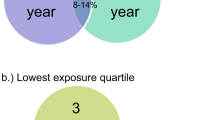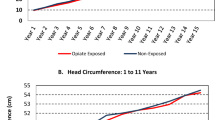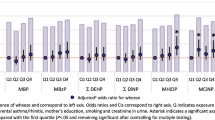Abstract
Exposure to phthalates, used as plasticizers and solvents in consumer products, is ubiquitous. Despite growing concerns regarding their neurotoxicity, brain differences associated with gestational exposure to phthalates are understudied. We included 775 mother-child pairs from Generation R, a population-based pediatric neuroimaging study with prenatal recruitment, who had data on maternal gestational phthalate levels and T1-weighted magnetic resonance imaging in children at age 10 years. Maternal urinary concentrations of phthalate metabolites were measured at early, mid-, and late pregnancy. Child IQ was assessed at age 14 years. We investigated the extent to which prenatal exposure to phthalates is associated with brain volumetric measures and whether brain structural measures mediate the association of prenatal phthalate exposure with IQ. We found that higher maternal concentrations of monoethyl phthalate (mEP, averaged across pregnancy) were associated with smaller total gray matter volumes in offspring at age 10 years (β per log10 increase in creatinine adjusted mEP = −10.7, 95%CI: −18.12, −3.28). Total gray matter volumes partially mediated the association between higher maternal mEP and lower child IQ (β for mediated path =−0.31, 95%CI: −0.62, 0.01, p = 0.05, proportion mediated = 18%). An association of higher monoisobutyl phthalate (mIBP) and smaller cerebral white matter volumes was present only in girls, with cerebral white matter volumes mediating the association between higher maternal mIBP and lower IQ in girls. Our findings suggest the global impact of prenatal phthalate exposure on brain volumetric measures that extends into adolescence and underlies less optimal cognitive development.
This is a preview of subscription content, access via your institution
Access options
Subscribe to this journal
Receive 12 print issues and online access
$259.00 per year
only $21.58 per issue
Buy this article
- Purchase on Springer Link
- Instant access to full article PDF
Prices may be subject to local taxes which are calculated during checkout


Similar content being viewed by others
Code availability
Analyses were performed in R Package version 3.4.1. Codes will be available upon request and communication with the corresponding author.
References
GBD. 2017 Child and Adolescent Health Collaborator. Diseases, Injuries, and Risk Factors in Child and Adolescent Health, 1990 to 2017: Findings From the Global Burden of Diseases, Injuries, and Risk Factors 2017 Study. JAMA Pediatr. 2019;173:e190337.
White TJ, Shaw P, Viding E. The what, where, and when of childhood psychopathology: first steps towards identifying the etiological factors that shape brain development. J Am Acad Child Adolesc Psychiatry. 2017;56:S326.
Bennett D, Bellinger DC, Birnbaum LS, Bradman A, Chen A, Cory-Slechta DA, et al. Project TENDR: targeting environmental neuro-developmental risks The TENDR consensus statement. Environ Health Perspect. 2016;124:A118–22.
Annex XVII to REACH – Conditions of Restriction, Entry 51. https://echa.europa.eu/documents/10162/aaa92146-a005-1dc2-debe-93c80b57c5ee, Accessed Date December 29, 2022.
Assessing and Managing Chemicals under TSCA: Phthalates. June 2022, https://www.epa.gov/assessing-and-managing-chemicals-under-tsca/phthalates. Accessed Date December 29, 2022.
Wu H, Kupsco AJ, Deierlein AL, Just AC, Calafat AM, Oken E, et al. Trends and patterns of phthalates and phthalate alternatives exposure in pregnant women from Mexico City during 2007–2010. Environ Sci Technol. 2020;54:1740–9.
Gao H, Zhu BB, Tao XY, Zhu YD, Tao XG, Tao FB. Temporal variability of cumulative risk assessment on phthalates in Chinese pregnant women: repeated measurement analysis. Environ Sci Technol. 2018;52:6585–91.
Woodruff TJ, Zota AR, Schwartz JM. Environmental chemicals in pregnant women in the United States: NHANES 2003–2004. Environ Health Perspect. 2011;119:878–85.
Shu H, Jonsson BA, Gennings C, Svensson A, Nanberg E, Lindh CH, et al. Temporal trends of phthalate exposures during 2007-2010 in Swedish pregnant women. J Expo Sci Environ Epidemiol. 2018;28:437–47.
Gaylord A, Kannan K, Lakuleswaran M, Zhu H, Ghassabian A, Jacobson MH, et al. Variability and correlations of synthetic chemicals in urine from a New York City-based cohort of pregnant women. Environ Pollut. 2022;309:119774.
Trasande L, Shaffer RM, Sathyanarayana S. Food additives and child health. Pediatrics 2018;142:e20181408.
Engel SM, Patisaul HB, Brody C, Hauser R, Zota AR, Bennet DH, et al. Neurotoxicity of ortho-phthalates: recommendations for critical policy reforms to protect brain development in children. Am J Public Health. 2021;111:687–95.
Zhang Q, Chen XZ, Huang X, Wang M, Wu J. The association between prenatal exposure to phthalates and cognition and neurobehavior of children-evidence from birth cohorts. Neurotoxicology. 2019;73:199–212.
Radke EG, Braun JM, Nachman RM, Cooper GS. Phthalate exposure and neurodevelopment: A systematic review and meta-analysis of human epidemiological evidence. Environ Int. 2020;137:105408.
van den Dries MA, Guxens M, Spaan S, Ferguson KK, Philips E, Santos S, et al. Phthalate and bisphenol exposure during pregnancy and offpsring non-verbal IQ. Environ Health Perspect. 2020;128:77009.
van den Dries MA, Ferguson KK, Keil AP, Pronk A, Spaan S, Ghassabian A, et al. Prenatal Exposure to Nonpersistent Chemical Mixtures and Offspring IQ and Emotional and Behavioral Problems. Environ Sci Technol. 2021;55:16502–14.
Casas M, Valvi D, Ballesteros-Gomez A, Gascon M, Fernandez MF, Garcia-Esteban R, et al. Exposure to Bisphenol A and Phthalates during Pregnancy and Ultrasound Measures of Fetal Growth in the INMA-Sabadell Cohort. Environ Health Perspect. 2016;124:521–8.
Fu Y, Dong J, You M, Cong Z, Wei L, Fu H, et al. Maternal di-(2-ethylhexyl) phthalate exposure inhibits cerebellar granule precursor cell proliferation via down-regulating the Shh signaling pathway in male offspring. Chemosphere. 2019;215:313–22.
Kougias DG, Sellinger EP, Willing J, Juraska JM. Perinatal exposure to an environmentally relevant mixture of phthalates results in a lower number of neurons and synapses in the medial prefrontal cortex and decreased cognitive flexibility in adult male and female rats. J Neurosci. 2018;38:6864–72.
Komada M, Gendai Y, Kagawa N, Nagao T. Prenatal exposure to di(2-ethylhexyl) phthalate impairs development of the mouse neocortex. Toxicol Lett. 2016;259:69–79.
Casey BJ, Giedd JN, Thomas KM. Structural and functional brain development and its relation to cognitive development. Biol Psychol. 2000;54:241–57.
Andreasen NC, Flaum M, Swayze V, O’Leary DS, Alliger R, Cohen G, et al. Intelligence and brain structure in normal individuals. Am J Psychiatry. 1993;150:130.
Reiss AL, Abrams MT, Singer HS, Ross JL, Denckla MB. Brain development, gender and IQ in children: A volumetric imaging study. Brain. 1996;119:1763–74.
Muetzel RL, Mous SE, van der Ende J, Blanken LM, van der Lugt A, Jaddoe VW, et al. White matter integrity and cognitive performance in school-age children: A population-based neuroimaging study. Neuroimage. 2015;119:119–28.
Lenroot RK, Giedd JN. Brain development in children and adolescents: Insights from anatomical magnetic resonance imaging. Neurosci Biobehav Rev. 2006;30:718–29.
Thomason ME, Hect JL, Rauh VA, Trentacosta C, Wheelock MD, Eggebrecht AT, et al. Prenatal lead exposure impacts cross-hemispheric and long-range connectivity in the human fetal brain. NeuroImage. 2019;191:186–92.
Rauh VA, Perera FP, Horton MK, Whyatt RM, Bansal R, Hao X, et al. Brain anomalies in children exposed prenatally to a common organophosphate pesticide. Proc Natl Acad Sci USA. 2012;109:7871–6.
Peterson BS, Rauh VA, Bansal R, Hao X, Toth Z, Nati G, et al. Effects of prenatal exposure to air pollutants (polycyclic aromatic hydrocarbons) on the development of brain white matter, cognition, and behavior in later childhood. JAMA Psychiatry. 2015;72:531–40.
Guxens M, Lubczynska MJ, Muetzel RL, Dalmau-Bueno A, Jaddoe VWV, Hoek G, et al. Air Pollution Exposure During Fetal Life, Brain Morphology, and Cognitive Function in School-Age Children. Biol Psychiatry. 2018;84:295–303.
England-Mason G, Grohs MN, Reynolds JE, MacDonald A, Kinniburgh D, Liu J, et al. White matter microstructure mediates the association between prenatal exposure to phthalates and behavior problems in preschool children. Environ Res. 2020;182:109093.
White T, Muetzel RL, El Marroun H, Blanken LME, Jansen P, Bolhuis K, et al. Paediatric population neuroimaging and the Generation R Study: the second wave. Eur J Epidemiol. 2017;33:99–125.
Kruithof CJ, Kooijman MN, van Duijn CM, Franco OH, de Jongste JC, Klaver CCW, et al. The Generation R Study: Biobank update 2015. Eur J Epidemiol. 2014;29:911–27.
Kooijman MN, Kruithof CJ, van Duijn CM, Duijts L, Franco OH, van IJzendoorn MH, et al. The Generation R Study: design and cohort update 2017. Eur J Epidemiol. 2016;31:1243–64.
Philips EM, Jaddoe VWV, Asimakopoulos AG, Kannan K, Steegers EAP, Santos S, et al. Bisphenol and phthalate concentrations and its determinants among pregnant women in a population-based cohort in the Netherlands, 2004-5. Environ Res. 2018;161:562–72.
Fischl B, van der Kouwe A, Destrieux C, Halgren E, Segonne F, Salat DH, et al. Automatically parcellating the human cerebral cortex. Cereb Cortex. 2004;14:11–22.
Desikan RS, Ségonne F, Fischl B, Quinn BT, Dickerson BC, Blacker D, et al. An automated labeling system for subdividing the human cerebral cortex on MRI scans into gyral based regions of interest. NeuroImage. 2006;31:968–80.
White T, Jansen PR, Muetzel RL, Sudre G, El Marroun H, Tiemeier H, et al. Automated quality assessment of structural magnetic resonance images in children: Comparison with visual inspection and surface-based reconstruction. Hum Brain Mapp. 2018;39:1218–31.
Muetzel RL, Mulder RH, Lamballais S, Cortes Hidalgo AP, Jansen P, Güroğlu B, et al. Frequent Bullying Involvement and Brain Morphology in Children. Front Psychiatry. 2019;10:696.
Kaufman AS, Raiford SE, Coalson DL (2015): Intelligent Testing with the WISC-V. First Edition ed. Hoboken: John Wiley & Sons.
Blok E, Schuurmans IK, Tijburg AJ, Hillegers M, Koopman-Verhoeff ME, Muetzel RL et al. Cognitive performance in children and adolescents with psychopathology traits: A cross-sectional multicohort study in the general population. Dev Psychopathol. 2023;35:926–940.
Daniel MH, Wahlstrom D, Zhang O. Equivalence of Q-interactive™ and Paper Administrations of Cognitive Tasks: WISC®–V. Q-Interactive Technical Report 2014; 8.
Prieler J. Raven’s Advanced Progressive Matrices 24. Mödling, Austria: Schufried 2003.
Benjamini Y, Hochberg Y. Controlling the false discovery rate: a practical and powerful approach to multiple testing. Journal of the royal statistical society Series B 1995;57:289–300.
MacKinnon DP. Introduction to statistical mediation analysis. Routledge. 2008.
Steen J, Loeys T, Moerkerke B, Vansteelandt S. medflex: An R Package for Flexible Mediation Analysis using Natural Effect Models. J Stat Softw 2017;76:46.
R core Team. A language and environment for statistical computing. Vienna, Austria. R Foundation for Statistical Computing. 2015.
van Buuren S, Groothuis-Oudshoorn C. MICE: Multivariate Imputation by Chained Equations in R. 2011.
Von Hippel PT. How to impute interactions, squares, and other transfored variables 2009; 39: 265-91.
Van Buuren S. Flexible Imputation of Missing Data Second edition. 2nd edn. Chapman & Hall/CRC Boca Raton, 2018.
Nieuwenhuijsen MJ Exposure assessment in environmental epidemiology. Oxford University Press, USA. 2015.
van Smeden M, Lash TL, Groenwold RHH. Reflection on modern methods: five myths about measurement error in epidemiological research. Int J Epidemiol. 2019;49:338–47.
Yu Z, Han Y, Shen R, Huang K, Xu YY, Wang QN, et al. Gestational di-(2-ethylhexyl) phthalate exposure causes fetal intrauterine growth restriction through disturbing placental thyroid hormone receptor signaling. Toxicol Lett. 2018;294:1–10.
Li X, Jiang L, Cheng L, Chen H. Dibutyl phthalate-induced neurotoxicity in the brain of immature and mature rat offspring. Brain Dev. 2014;36:653–60.
Lin LC, Wang SL, Chang YC, Huang PC, Cheng JT, Su PH, et al. Associations between maternal phthalate exposure and cord sex hormones in human infants. Chemosphere. 2011;83:1192–9.
Miranda A, Sousa N. Maternal hormonal milieu influence on fetal brain development. Brain Behav. 2018;8:e00920.
Wai J, Lubinski D, Benbow CPJJoeP. Spatial ability for STEM domains: Aligning over 50 years of cumulative psychological knowledge solidifies its importance. J Educ Psychol 2009;101:817–835.
King MJ, Katz DP, Thompson LA, Macnamara BN. Genetic and environmental influences on spatial reasoning: A meta-analysis of twin studies. Intelligence. 2019;73:65–77.
Xu H, Shao X, Zhang Z, Zou Y, Chen Y, Han S, et al. Effects of di-n-butyl phthalate and diethyl phthalate on acetylcholinesterase activity and neurotoxicity related gene expression in embryonic zebrafish. Bull Environ Contam Toxicol. 2013;91:635–9.
Poopal RK, Ramesh M, Maruthappan V, Babu, Rajendran R. Potential effects of low molecular weight phthalate esters (C(16)H(22)O(4) and C(12)H(14)O(4)) on the freshwater fish Cyprinus carpio. Toxicol Res. 2017;6:505–20.
Tran CM, Do TN, Kim K-T. Comparative analysis of neurotoxicity of six phthalates in zebrafish embryos. Toxics 2021;9:5.
Whyatt RM, Liu X, Rauh VA, Calafat AM, Just AC, Hoepner L, et al. Maternal prenatal urinary phthalate metabolite concentrations and child mental, psychomotor, and behavioral development at 3 years of age. Environ Health Perspect. 2012;120:290–5.
Doherty BT, Engel SM, Buckley JP, Silva MJ, Calafat AM, Wolff MS. Prenatal phthalate biomarker concentrations and performance on the Bayley Scales of Infant Development-II in a population of young urban children. Environ Res. 2017;152:51–8.
Acknowledgements
The Generation R Study is conducted by the Erasmus Medical Center in close collaborations with the School of Law and Faculty of Social Sciences of the Erasmus University Rotterdam, the Municipal Health Service Rotterdam area, Rotterdam, the Rotterdam Homecare Foundation, Rotterdam and the Stichting Trombosedienst and Artsenlaboratorium Rijnmond (STAR-MDC), Rotterdam. We gratefully acknowledge the contribution of children and parents, general practitioners, hospitals, midwives and pharmacies in Rotterdam. The general design of the Generation R Study is made possible by financial support from the Erasmus Medical Center, Rotterdam, the Netherlands, the Organization for Health Research and Development (ZonMw) and the Ministry of Health, Welfare and Sport. This study was supported by grant R01ES022972 and R01ES029779 from the National Institutes of Health (NIH) to LT. Neuroimaging and infrastructure was supported by the Netherlands Organization for Health Research and Development (ZonMw) TOP project number 9121102. The work of AG is supported by grant R01ES032826 from NIH. The work of MD is supported by grant 824989 from the Horizon2020 programme of the European Union. HT is supported by the ZonMW grant 016.VICI.170.200. MG is funded by a Miguel Servet fellowship (CPII18/00018) awarded by the Spanish Institute of Health Carlos III. We acknowledge support from the Spanish Ministry of Science and Innovation through the “Centro de Excelencia Severo Ochoa 2019–2023” Program (CEX2018-000806-S), and support from the Generalitat de Catalunya through the CERCA Program. SME was supported by P30ES010126 and R01ES021777. VWVJ and MG received funding from the European Union’s Horizon 2020 research and innovation programme (Grant Agreement No. 733206 LifeCycle and Grant Agreement No. 874583 ATHLETE). The research was supported in part by the Intramural Research Program of the NIMH.
Author information
Authors and Affiliations
Contributions
AG conceptualized and designed the study, drafted the manuscript, interpreted the results, and reviewed and revised the manuscript; MvdD conceptualized and designed the study, carried out the analysis, and reviewed and revised the manuscript; M-PM-M and KK performed laboratory analysis of phthalates in urine. SLcarried out the analysis, and reviewed and revised the manuscript; SS, White, Pronk, Kannan, Jaddoe, Engel, and LT interpreted the results and reviewed and revised the manuscript; HT and MG conceptualized and designed the study, interpreted the results, and reviewed and revised the manuscript; all authors approved the final manuscript as submitted and agree to be accountable for all aspects of the work. MG has full access to all the data in the study.
Corresponding author
Ethics declarations
Competing interests
The spouse of HT is an employee of Eastman Chemical, a company that manufactures substitutes for ortho-phthalate plasticizers. Other authors have no conflict of interest.
Additional information
Publisher’s note Springer Nature remains neutral with regard to jurisdictional claims in published maps and institutional affiliations.
Supplementary information
Rights and permissions
Springer Nature or its licensor (e.g. a society or other partner) holds exclusive rights to this article under a publishing agreement with the author(s) or other rightsholder(s); author self-archiving of the accepted manuscript version of this article is solely governed by the terms of such publishing agreement and applicable law.
About this article
Cite this article
Ghassabian, A., van den Dries, M., Trasande, L. et al. Prenatal exposure to common plasticizers: a longitudinal study on phthalates, brain volumetric measures, and IQ in youth. Mol Psychiatry 28, 4814–4822 (2023). https://doi.org/10.1038/s41380-023-02225-6
Received:
Revised:
Accepted:
Published:
Issue Date:
DOI: https://doi.org/10.1038/s41380-023-02225-6



